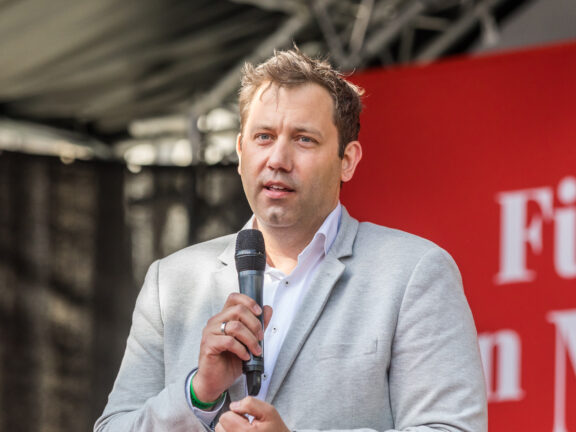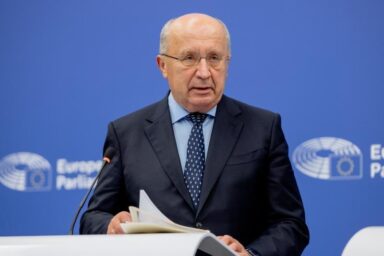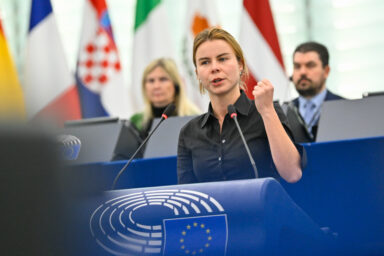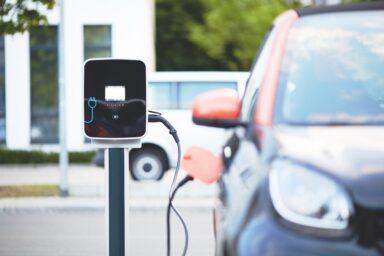Any hopes of European Union’s defence assuming a viable form rest with Germany. To save Europe as a geopolitical force, the country now must do precisely what came close to destroying the continent in the past: put its formidable arms industry into a frenzied overdrive. The incoming government appears to have a firm grasp of the urgency. Lars Klingbeil, the incoming Vice-Chancellor and Finance Minister, just might be an unexpected messenger of hope.
In a dimly lit Berlin conference room on March 5th, the Chancellor-in-waiting Friedrich Merz—a Christian Democrat once dubbed “the most hated man in German politics” by his own party—declared: “We will do whatever it takes to defend freedom in Europe.” The phrase, uttered shortly after Mr Merz sealed a coalition deal with the Social Demorats, was a deliberate echo of Mario Draghi’s 2012 vow to save the euro.
Mr Merz’s next move, to name Lars Klingbeil as his deputy and Finance Minister, was rich with unintentional irony. Here comes a Social Democrat, heir to a party that once marched under the banner of Friedenspolitik or peace politics, now poised to bankroll Europe’s most ambitious military overhaul since the Cold War. In normal times, the volte-face would have given Willy Brandt a whiplash.
But these are not normal times. Donald Trump’s return to the White House, his threats to abandon NATO, and Russia’s grinding war in Ukraine have upended Germany’s post-war orthodoxy. Mr Klingbeil, a 47-year-old guitar-strumming SPD pragmatist with a penchant for Bayern Munich and a distaste for pacifism, is at the heart of this transformation. His rise from a 9/11-shaken intern in New York to the future architect of Germany’s €500bn defence splurge tells a story of a crisis reshaping politicians, parties, and perhaps an entire continent.
You might be interested
From Ground Zero to Ground Defence
Mr Klingbeil’s political identity was forged, somewhat improbably, on the streets of Manhattan. He arrived there in the morning of 11 September 2001, just after the first airplane hit the World Trade Center. “This day will change the world,” his boss told him as they fled their office, a prophecy that simmered in the young German’s mind.
The son of a Bundeswehr officer, who had refused military service himself, Mr Klingbeil returned to academia to study American defence policy, later entering the Bundestag in 2009 as a defence specialist. His thesis: security cannot be outsourced.
That conviction now underpins his pending role as finance minister and, by extension, de facto defence chief. The SPD’s decision to back Mr Merz’s “fiscal sea change”—exempting defence spending from Germany’s sacrosanct debt brake and unleashing €500bn for infrastructure—has stunned critics. “Klingbeil is gambling with the SPD’s soul,” grumbled Kevin Kühnert, his erstwhile left-wing SPD rival, in a March 2024 interview with Der Spiegel. Yet the move is vintage Seeheimer Kreis, the SPD’s centrist faction that Mr Klingbeil quietly champions. Founded in the 1970s to anchor the party in Realpolitik, the group has long argued that governing requires messy compromises, even with conservatives like Mr Merz.
“The Seeheimer mindset is simple: if you’re not at the table, you’re on the menu,” said Thomas Kutschaty, a Seeheimer stalwart, in a 2023 Frankfurter Allgemeine profile. For Mr Klingbeil, that pragmatism meant shedding his early admiration for Gerhard Schröder, the SPD chancellor turned Putin apologist. “I respected Schröder’s reforms, but his Russia blindness was a betrayal,” Mr Klingbeil told Der Spiegel in 2023. The rebuke was tactical, distancing him from the SPD’s pro-Russia old guard as Vladimir Putin’s tanks were rolling toward Kyiv.
The fiscal irony
Mr Klingbeil’s critics carp that a man who once organised anti-neo-Nazi protests in Münster now champions Europe’s largest military budget since 1945. But the numbers are stark: Germany’s defence spending will leap from 1.6% of GDP to 3% by 2028, funded by debt—something of a heresy in a nation that wrote budget austerity into its constitution. The yield on Berlin’s 10-year bonds, or Bunds, as they are known in the financial community, spiked 0.19 points overnight after Mr Merz’s announcement, a “seismic shift” in borrowing, analyst Tomasz Wieladek of T Rowe Price wrote in Financial Times.
The development leaves Germany’s left flank apoplectic. “This isn’t social democracy; it’s militarised neoliberalism,” fumed Die Linke’s Bundestag deputy Dietmar Bartsch in a Tagesschau interview. Yet Mr Klingbeil, ever the Seeheimer bridge-builder, retorts that security is the ultimate social good. “Freedom isn’t free, and neither is peace,” he told the 2023 party congress, channelling Ronald Reagan through a collectivist lens. Even his pandemic-era gas price caps—a €200bn cushion for households—are recast as “defence stabilisers” to sustain public support for rearmament.
The irony is thicker than Schwarzbrot. Germany’s debt brake, enshrined by Angela Merkel in 2009 to curb profligacy after the financial crisis, is now being bent by a centre-left finance minister to bankroll tanks. “Klingbeil’s using a neoliberal tool for Vorsprung durch Technik militarism,” sniffed Green MEP Sven Giegold in Die Zeit in March. Yet the Defence Ministry’s wishlist—hypersonic missiles, drone swarms, a revived Luftwaffe—suggests Mr Klingbeil cares little for ideological purity. “We’re not pacifists. We’re realists,” he insists.
NATO’s new pillar
For NATO, Mr Klingbeil’s rise is a double-edgedsword. His €500bn infrastructure fund aims to revive Germany’s sclerotic railways and ports, critical for mobilising troops. “A Bundeswehr general once told me moving a division to Poland would take three weeks. The Russians would need three days,” the incoming Vice-Chancellor told Die Zeit last month. The fund, he argues, is “defence by other means”.
Yet his vision had better extend beyond the Alliance. The proposed EU Defence Industrial Strategy demands “strategic autonomy” in arms production—a jab at Trump’s transactional Atlanticism. “Europe can’t outsource its security to a reality TV star,” he quipped at a closed-door SPD meeting last February, according to FAZ. Translation: Germany must lead a EU defence core, even if it ruffles Washington.
Berlin’s “autonomy lite” has tended to irk France. “The Germans want European defence—but only if it’s made in Germany,” gripes a French diplomat. Still, Mr Klingbeil’s pledge to fast-track Franco-German projects—a sixth-gen fighter jet, a European drone—may generate positive response in Paris.
His tougher sell is Eastern Europe. Poland’s hawkish defence minister, Władysław Kosiniak-Kamysz, dismisses Mr Klingbeil’s sanctions maximalism as “too little, too late”. Yet the SPD co-leader’s push to confiscate €300bn in frozen Russian assets for Ukraine’s reconstruction—a plan the EU approved in June 2024—has won cautious praise. “Finally, Germany is thinking geopolitically,” says Ivan Krastev of the Centre for Liberal Strategies.
The Ukraine Calculus
Mr Klingbeil’s blueprint for Ukraine blends the trademark Social-Democrat idealism with Seeheimer steel. As SPD co-leader, he championed the “Zeitenwende” defence upgrade after Russia’s invasion, backing every EU sanctions package—including the 12th, which targeted Russian LNG and shadow oil fleets. “Sanctions aren’t a silver bullet, but they’re our strongest non-military tool,” he told the Bundestag as early as in March 2022.
Yet his realism shows in the opennes to compromises. While the Greens demanded a total Russian gas embargo in 2022, Mr Klingbeil carved exemptions for fertiliser exports to prevent a global food crisis. “You can’t punish Moscow by starving Cairo,” he argued in a 2022 FAZ op-ed—a nod to his Seeheimer mantra: “Effective, not dogmatic.”
On arms, his record is bolder. Mr Klingbeil lobbied Olaf Scholz to send Leopard tanks to Kyiv in 2023, a move that boosted his popularity within the SPD. Now, as finance chief-in-waiting (with one foot in the defence ministry), he’s refused to rule out greenlighting Taurus missile shipments—a red line for Scholz—and pushing a “Marshall Plan for Ukraine” funded by seized Russian assets. “Putin will pay, one way or another,” he vows.
The Gauntlet Ahead: Debt, Discontent, and the AfD
The hardline stance masks dilemmas. With Trump halting US military aid, Mr Klingbeil must balance Ukraine’s demands with German fatigue. Yet his retort remains unflinching: “If we let Ukraine fall, the Baltics are next. NATO’s credibility is non-negotiable,” he told the ARD television.
Mr Klingbeil’s fiscal tightrope is his trickiest act. The debt brake suspension lets him borrow €100bn yearly for defence, but inflation remains stubborn at 4%. Throwing money at the Bundeswehr won’t magically fix decades of neglect. The infrastructure fund, meanwhile, risks becoming a pork-barrel bonanza.
Domestically, the SPD’s left accuses him of betraying welfare for warfare (you can’t fund F-35s by cutting Hartz IV, the slogan goes, Hartz being a set of recommendations on reforms to the German labour market). Mr Klingbeil’s response—a €10bn “social cohesion” package—has so far muted dissent. But with the far-right AfD topping the national polls at 25%, his real fear is a populist backlash. “Nothing would please Putin more than Germany divided,” he told Tagesschau last month.
Normalcy is over
Internationally, his test is EU unity. Hungary’s Viktor Orbán, ever the spoiler, vows to block the EU’s new defence bonds. Yet Mr Klingbeil’s threat to freeze EU funds for Budapest—a Seeheimer-endorsed hardball tactic—shows he’s done pussyfooting.
Lars Klingbeil is an unlikely revolutionary. A guitar hobbyist who quotes Bob Dylan in speeches, he lacks the machismo of defence ministers past. Yet his blend of SPD idealism and Seeheimer pragmatism may be Germany’s best hope for navigating an age of chaos. The contradictions are glaring. A party founded to oppose militarism now spearheads rearmament. A debt-averse nation borrows wildly to revive its martial vigour. And a German Social Democrat, of all people, is the face of Europe’s new Realpolitik. These are not normal times. For Germany, Europe, and NATO, the era of normalcy is over.











